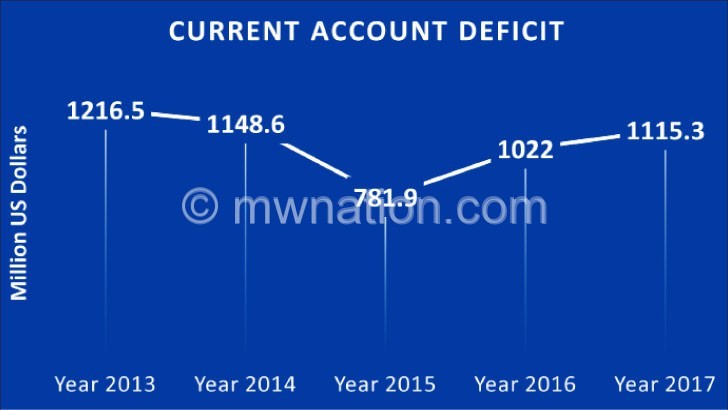Current account deficit jumps 8%
Malawi is expected to record a current account deficit of $1.11 billion (K810 billion) this year from the previous year’s $1.02 billion (K744 billion), figures from the Reserve Bank of Malawi (RBM) show.
The eight percent jump in current account deficit means that the country’s value in imports of goods, services and investment incomes is greater than the value of exports.
Malawi continues to suffer from a negative trade balance in general due to the country’s insatiable appetite for foreign goods, and relies on imported inputs for production.
However, development economists argue that a current account deficit is not necessarily bad depending on the nature of imports and exports. They argue that imports in machinery equipment and services that will boost industrial production for exports could result into a current account surplus the subsequent year following high production.
In an interview, RBM spokesperson Mbane Ngwira said the country is not diversifying enough in terms of export production while the demand for imports is growing and that people are importing almost everything.
He said the country needs to produce, observing that the central bank is contributing to this direction through support it gives to the Export Development Fund (EDF)—a development finance institution with a particular focus on export—and other import substitution activities.
“Local investment ventures should be channeled to production of exportable goods. One needs to check on what items are being imported to worsen the deficit. “If the goods are more for investment purposes, well and good for the future, but if most of the imports are consumables, it will not contribute significantly to future production,” said Ngwira.
Ben Kaluwa, an economic professor at Chancellor College, a constituent college of the University of Malawi, said current account projections will largely depend on the outcome and pricing of country’s main exports such as tobacco and sugar.
He urged on the need to attract more foreign direct investment (FDI) that would help in the export sector.
So far, Malawi has attracted FDI worth K4.7 trillion from 2011 to mid-2016, most of which was in the energy sector, according to Malawi Investment and Trade Centre (Mitc).
According to experts, recurrent current account deficits have a dent on the country’s gross official reserves and in turn affect the value of the local currency.
Imports of non-essential goods and services may imply that the local currency maybe be overvalued; hence, encouraging imports and hurting exporters.
However, monetary authority policies are aimed at growing the country’s gross official reserves, currently at 2.86 months of import cover as of February 2017 slightly below the preferred three months, which is regarded as a rule of thumb.





